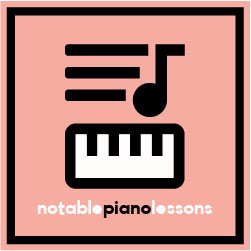After teaching piano lessons for over 20 plus years you start noticing patterns of why some people don’t excel at the piano. Here are 6 things that frustrate me as a piano teacher that I see when I teach piano lessons for beginners.
Mistake #1 They look at their fingers. Some people teach that it doesn’t matter if people look at their fingers when learning to play the piano. I strongly disagree. Yes you do need to look down at your hands in the beginning to get started but when you practice not looking at your fingers that is where the magic happens. If you watch people who are proficient at the piano they are not looking down at their hands all the time.
It’s close to typing or in today’s modern world keyboarding. When I first learned how to type way back in highschool one of the first things our teacher told us is that we absolutely need to not look at our hands. He was so emphatic about it and reiterated it over and over again. I took that pretty seriously and became the fastest typist in my class.
I’ve noticed that people who have all these pauses when they play the piano is because they are looking down at their hands constantly to search for the correct piano keys. They have practiced this from the beginning and it can be kind of hard to break. One tip that I suggest is that they put a paper towel over their hands when they practice. I actually do this with a book occasionally that I hold over their hands (which gets extremely tiresome for my arms) at times to help them not look down at their hands. I always get some smiles when I do this because they have to really think.
Mistake #2 They try to play the music without counting the rhythm. I get it counting can be kind of boring. You just want to be able to play the song. The only thing is, you end up not playing the song correctly when you don’t learn to count rhythms. You also end up becoming a weak counter which makes it hard to play new music correctly.
One way I try to help my students overcome this is to ask them to count out loud for a portion of the song if not the whole song at times. This really helps a lot. Even then they don’t always count evenly so I suggest they use a metronome during some of their practice. Playing with a metronome takes some time to get used to and I have to work with them for a bit for them to feel comfortable with this. This is where you want to play at a pretty slow tempo so it’s not so hard. I can not tell you how important it is to learn how to count piano rhythms correctly from the beginning.
Mistake #3 They practice their mistakes. When you don’t know you are making a mistake, you just keep practicing it that way. That’s why I think students listening to the song over and over again can help train their ear of how the song is supposed to sound and then they can match their playing to how it should sound. It doesn’t matter how much I can tell them to count, etc. until they hear it sometimes, they don’t seem to be able to correct it. They have a version playing in their head of how it should sound.
Mistake #4 They don’t practice the piano consistently. I remember this parent of one of my piano students I taught say that she had her daughter practice for a couple of hours one day a week. This is not an effective way to practice and obtain results. The brain likes repetition and consistency.
If you want to 10X your progress you practice consistently with at least 4 practices each week. It doesn’t have to be for hours on end either. When you first start out even 10 minutes if done consistently can yield huge results. It’s kind of like the snowball effect. You just keep growing your piano playing skills and getting better and better with each practice when you practice consistently.
Mistake #5 They never pick up any other material to practice other than what the teacher asks them to do.
I can usually tell which of my students are going to be the ones that learn how to play the piano well. It’s the ones that bring music to me that they want to learn or that they have tried to learn at home and need a little more help.
The brain will develop music reading skills much more rapidly when we expose it to all different types of material. This is what I did with my beginning piano skills when I first started. I took what I knew and then just went searching for different music my family had stored in our piano bench. I tried all of it–even though I wasn’t really at that level. The songs I liked, I practiced more.
This is where the magic happens. You take the skills you have been taught and you apply them to all different types of music. If there ever is a suggestion for new students it is to look for some piano music that is about your level and start playing new material so you get a lot of practice at reading piano music.
Mistake #6 They don’t take piano technique seriously! So often students come back to lessons without practicing their scales, chords, inversions and arpeggios. Therefore they don’t master the skills to be able to play challenging music and read the key signatures of new music.
I’m sure I didn’t practice my scales when I was younger as much as my teacher would have liked me to have. Music is made up of scales, chords, arpeggios and inversions. If you try to short cut really understanding these basic rudimentary skills, you shut the door on so many opportunities of learning to play by ear, composition, and just understanding what is happening when you are reading a piece of music. There are several good reasons you want to learn and understand basic technical skills even if you want to become just an intermediate pianist.
Don’t listen to those who promise you quick results. Learn the foundational piano skills to become a great pianist! It is never too late to learn.
I’m Lohnay Bishoff and I teach beginning piano lessons for adults online using the Mayron Cole Piano Method.
You may learn more about me and my adult piano classes at the piano membership notablepianolessons.com where I serve Adult Older Beginner piano lessons online.
My tutorials focus predominantly on Mayron Cole Level 1 which is a fast track older beginner piano course. I sprinkle my beginning piano lessons with masterclass technique and chording tutorials. You can view my piano lessons online anytime at your convenience when you join at notablepianolessons.com
In my membership you have access to over a hundred tutorials that teach you how to play the piano supplemented with several beginning tutorials such as Fur Elise, Moonlight Sonata and a beginning mini course on Ode to Joy!


